Chapter 4
Pledge Service
The Pledge of the Families
We families, the center of the cosmos, brothers and sisters vertically connected and flesh and blood of the True Parents before the new heaven, pledge and swear before the True Parents to become worthy of possessing the glory of victors by maintaining our positions in responsible activities and by observing the family laws and traditions decreed by heaven. This I pledge. (Recite three times)
After the 36 Couple Blessing in 1961, Father proclaimed The Pledge of the Families prior to introducing My Pledge. The content outlines the blessed couples' standard and goal as well as responsibilities, which should always be kept in our minds and hearts.
Blessed couples should recite The Pledge of the Families (see this chapter, Format for Blessed Members' Pledge Service, for details) before My Pledge, realizing their proper positions as blessed families.
My Pledge
1. As the center of the cosmos, I will fulfill our Father's will (purpose of creation), and the responsibility given me (for self- perfection). I will become a dutiful son (daughter) and a child of goodness to attend our Father forever in the ideal world of creation (by) returning joy and glory to Him. This I pledge.
2. I will take upon myself completely the Will of God to give me the whole creation as my inheritance. He has given me His word, His personality, and His heart, and is reviving me who had died, making me one with Him and His true child. To do this, our Father has persevered for 6,000 years the sacrificial way of the cross. This I pledge.
3. As a true son (daughter), I will follow our Father's pattern and charge bravely forward into the enemy camp, until I have judged them completely
with the weapons with which He has been defeating the enemy Satan for me throughout the course of history, by sowing sweat for earth, tears for man, and blood for heaven, as a servant but with a father's heart, in order to restore His children and the universe, lost to Satan. This I pledge.
4. The individual, family, society, nation, world, and cosmos who are willing to attend our Father, the source of peace, happiness, freedom and all ideals, will fulfill the ideal world of one heart in one body by restoring their original nature. To do this, I will become a true son (daughter), returning joy and satisfaction to our Father, and as our Father's representative, I will transfer to the creation peace, happiness, freedom, and all ideals in the world of the heart. This I pledge.
5. I am proud of the one Sovereignty, proud of the one people, proud of the one land, proud of the one language and culture centered upon God, proud of becoming the child of the One True Parent, proud of the family who is to inherit one tradition, proud of being a laborer who is working to establish the one world of the heart.
I will fight with my life. I will be responsible for accomplishing my duty and mission. This I pledge and swear. (Recite three times)
True Parents proclaimed My Pledge and taught the Korean members its significance on October 1, 1962 (lunar calendar), the third anniversary of Children's Day.
Its contents express the main conditions of being a child of God and the True Parents; when reciting My Pledge it is important to do so with an attitude of attendance.
In "The Way of Tradition" Father mentioned the following:
When there is any special gathering, read My Pledge in unison.
Pledge Service Time and Location
Service Time With the heart of attendance, we should feel as though we offer Pledge at the same time as the True Parents, whether or not this is the case according to the local time.
Sunday Mornings. Pledge service should begin at 5:00 a.m. on Sunday mornings. In special circumstances, Pledge service can be held before 5:00 a.m. For example, Father has suggested that Ocean Church members hold Pledge before they go out to sea.
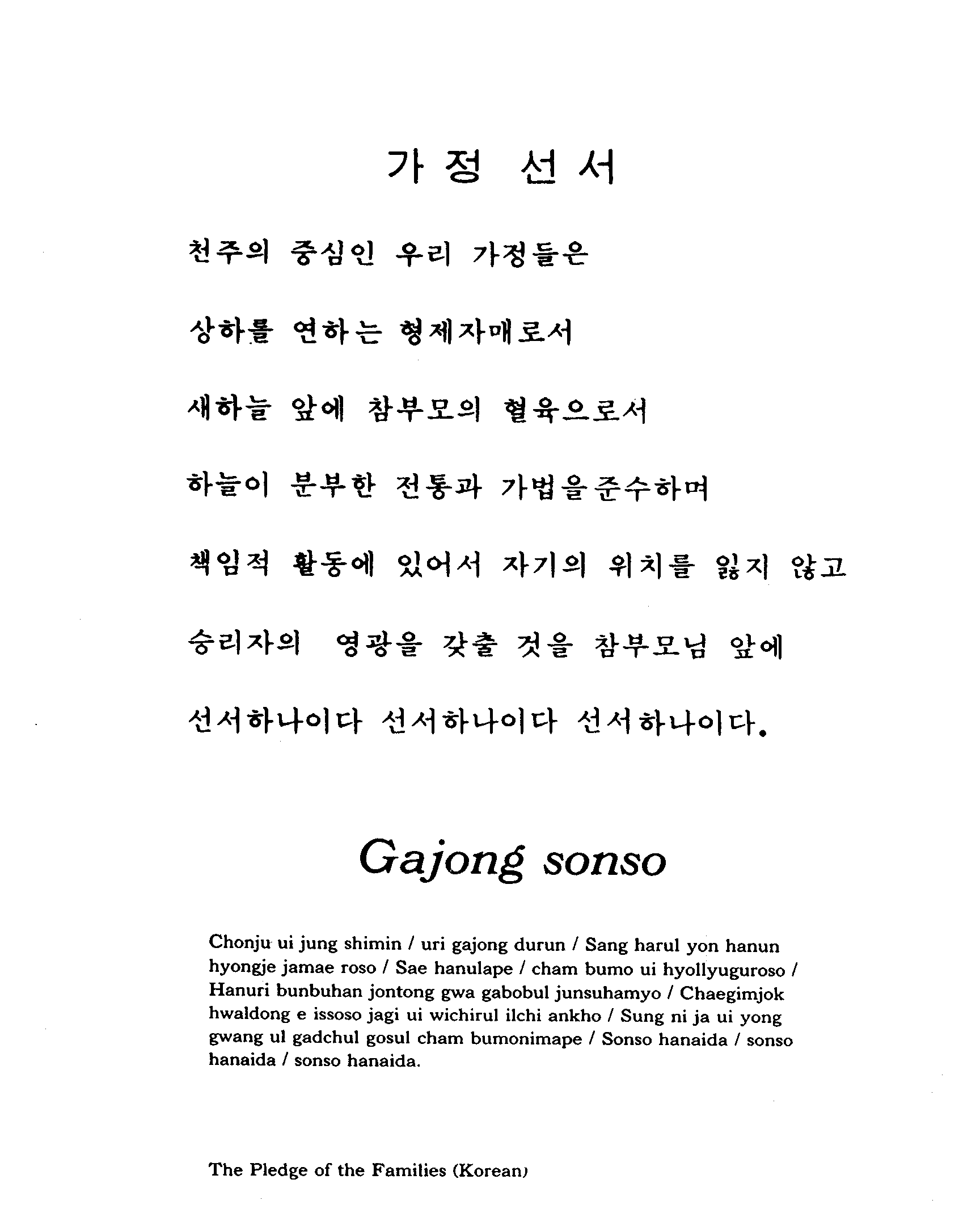
Figure 4-A
The Pledge of the Families in Korean and transliteration.
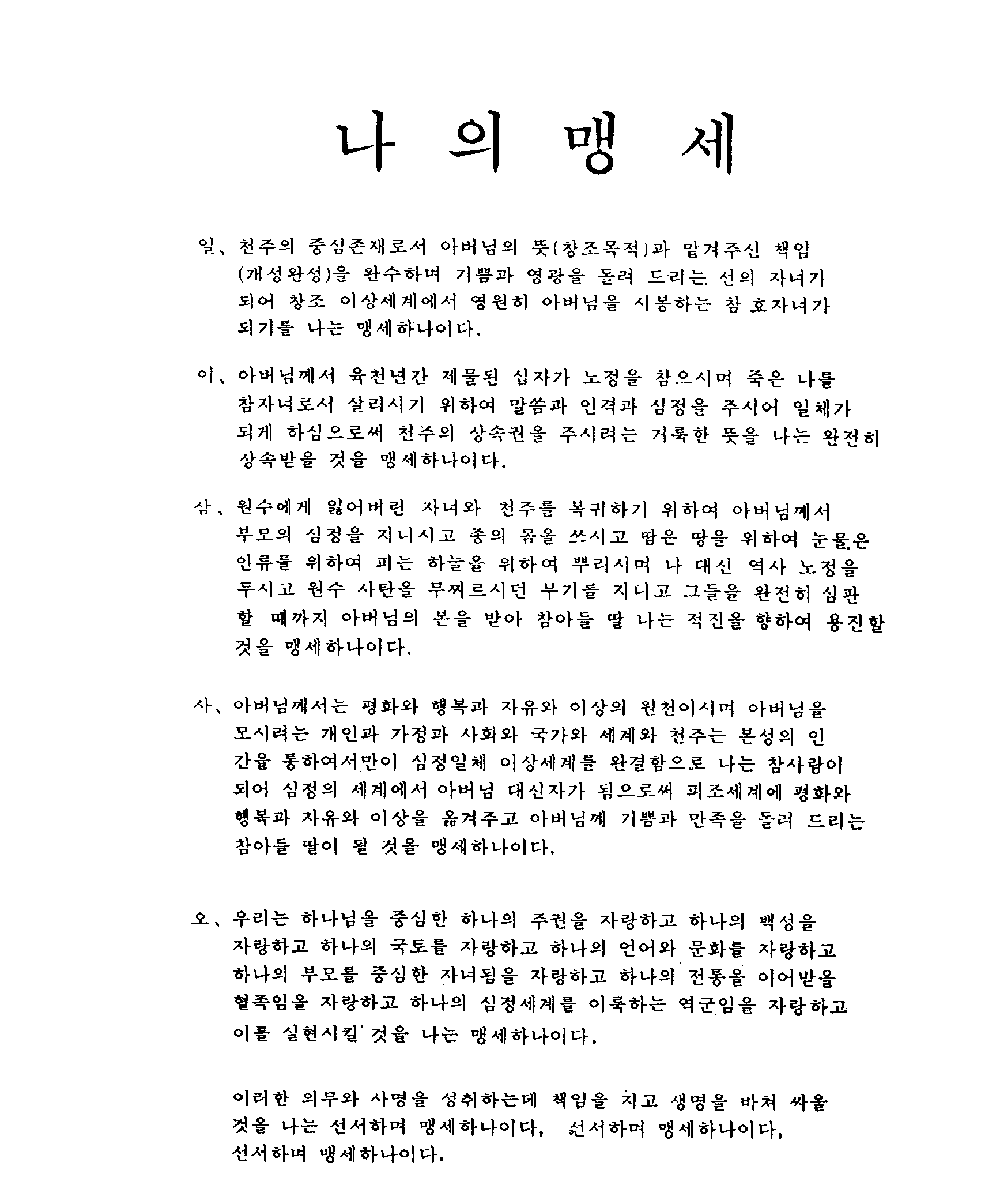
Figure 4-B
My Pledge in Korean.
[Page 24]
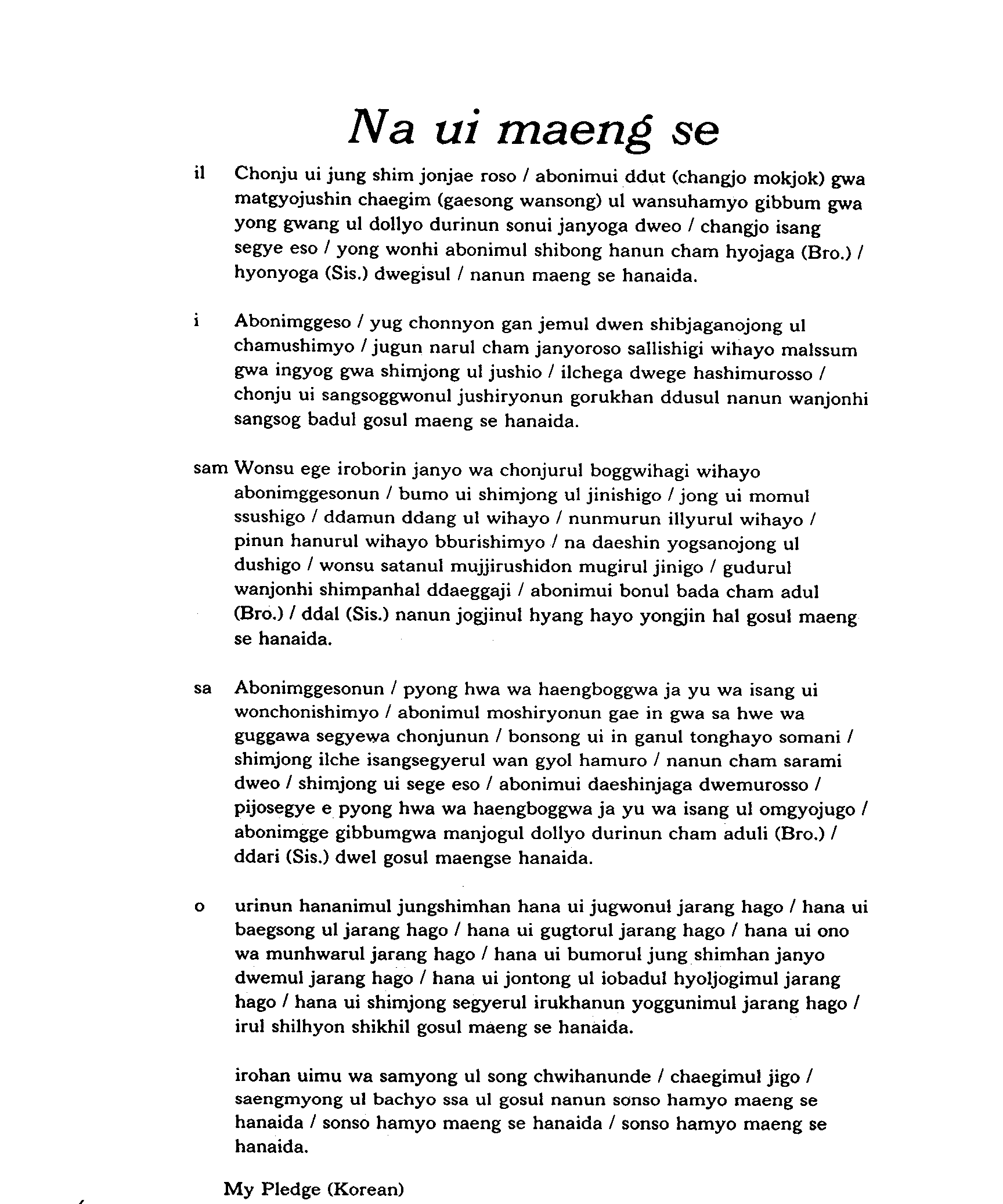
Figure 4-C
My Pledge in Korean transliteration.
Those who attend Belvedere service may elect to hold Pledge before they depart from their centers or homes. Participation in an early morning service indicates that the first thought of each week is pledged and offered to God, expressing a redetermination of faith and attendance.
The First of the Month. Pledge services should also be held at 5:00 a.m. on the first morning of each month. By keeping this tradition the first thought and action of each month is offered to God. When we start them with God, they then become His and no longer belong only to ourselves.
Daily Recitation of Pledge.
If My Pledge is recited each day of the week as part of morning service, it is not necessary to begin at 5:00 a.m. Although our pledge to God is traditionally offered on Sunday mornings and the first day of the month, True Parents proclaimed this Pledge not just to be recited at formal Pledge service times. Father desires that we renew its contents in our hearts every day. Therefore, it may be recited on the other six days of the week (it is not necessary to bow) as part of morning service.
The first prayer offered each morning is also part of our personal pledge to God for that day.
Recitation of Pledge on Holy Days.
Although My Pledge traditionally is recited as part of each Holy Day celebration service (see chapter 14, Holy Days: Format for Holy Day Celebration Service) at 7:00 a.m., blessed couples may also desire to hold a Pledge service at the usual time of 5:00 a.m. on a Holy Day.
Where to Hold Pledge Service
At Holy Ground. In the early days of the Korean Unification Church, Pledge service was not held in the church center but at Holy Ground. Members arrived as much as thirty minutes before it began and prayed silently. Some members of the church in Korea continue to do this.
Although any Pledge service may be held at Holy Ground, a leader may choose to hold only the Pledge services on the first of each month there to make them especially meaningful.
It may also be desirable to hold the morning prayer service of each Holy Day at Holy Ground. (If this is done, blessed couples need not wear Holy Robes to the service.)
In the Center or Home.
If it is decided to hold Pledge service in the center or home it is suggested that one use the place that is designated as the permanent prayer room or area.
However, if this room or area is not ample, it would be appropriate to take the permanent altar from the prayer area and set it up in a room that does provide enough space.
External Preparation for Pledge Service
Service Area
The entire area in which Pledge service will be held should be cleaned prior to service time.
Before the congregation assembles, Pledge cards may be placed at appropriate spaces in the room or near the door for members to pick up as they enter the room.
Altar Preparation
It is proper to place the altar on the north wall, as north symbolically represents God's direction. If this is impossible because of the location of windows, doors, etc., position the altar along any other wall.
If it is possible, cover the altar with a cloth (white is preferable), and place a picture of the True Parents or the True Family on it.
Fresh flowers and one or more Shimjung Candles are added touches for the altar. The Shimjung Candle(s) may be burned during Pledge service.
Grooming and Dress Code
Particular attention should be paid to personal cleanliness and grooming.
Holy Robes.
Blessed couples may choose to wear their Holy Robes at Pledge service; this is a recommended practice although not mandatory. All blessed members may wear Holy Robes. Engaged couples, however, should wait until after participating in the Blessing ceremony to wear Holy Robes.
Blessed couples may wear Holy Robes no matter which Pledge service they attend (refer to this chapter, Format for Blessed Members' Pledge Service.)
Clothing.
Members not wearing Holy Robes should reserve their best clothing for this precious time with God. It is most appropriate for men to wear suits and ties. Women should select a dress or suit and, under normal circumstances, should avoid wearing slacks.
If it is not possible for a member to wear his or her best clothing, he or she should select garments which are cleaned and pressed.
Format for General Pledge Service
Gathering Time
Assemble earlier than 5:00 a.m., reserving this time for meditation or silent prayer. In the early days, members often gathered as much as thirty minutes or one hour before the service began.
Internal Preparation
Singing Holy Songs or offering silent prayers are traditional ways of preparing the atmosphere before Pledge service. When many people gather for the service it is especially good to have a silent prayer, and then during the last stage of preparation, to sing a Holy Song to make a holy atmosphere.
The announcement preceding the recitation of the Pledge should begin exactly at 5:00 a.m.; therefore, songs or silent prayers should be offered beforehand.
Service Leader
One person should lead the Pledge service, for example, the center director or an elder blessed member. If an older blessed member or church elder visits and participates in the Pledge service, it is proper to ask that person to lead the service; however, if he or she declines, the center leader should lead it.
Formation
The leader of the service should stand directly facing the altar, one step ahead of the other members. If space does not permit, it is possible for him or her to stand in the same line as the others.
It is traditional, especially in large congregations, for the other members to form rows based upon the order of Blessings (i.e., 36 Couples in front, 72 Couples behind them, 124 Couples behind, etc.). This is not compulsory, however.
Facing the altar, men should stand on the right side and women on the left side of the room.
Format
Details of the format listed below are described in the following sections. Meditation/Silent Prayer Holy Song/Silent Prayer (optional) Announcement to begin Pledge Bows Recitation of Pledge Representative (one) prayer Announcements/speech Representative prayer (optional) Unison prayer Closing song
Announcement to Begin Pledge. It is suggested that the service leader begin with the words, "(Let us begin) Pledge Service for (date)."
Bows. Before reciting the contents of the Pledge, three full bows1 are offered. (Refer to chapter 1, Attendance Etiquette: Offering a Full Bow for the description of the proper way to bow.)
After completion of the third bow, rise again, make a slight bow (with head and upper part of the body, not a bow to the waist), and stand through the recitation of the Pledge.
Significance of bows. These bows are offered to God; three bows are offered because three is the number of perfection. It is acceptable to bow only once, representing the three bows. (For example, only one bow is offered at birthday celebrations for the True Children at East Garden.)
During the bows, think of Heavenly Father and True Parents together, or focus on God first, then True Father, then True Mother. We offer Pledge to God, but the contents also relate to our life of attendance to both God and True Parents. Our attendance to God is offered through the True Parents, who are Heavenly Father's representatives, and in this sense we can imagine that the first bow is dedicated to God, the second to True Father, and the third to True Mother.
Recitation of Pledge. The contents of Pledge are serious; we proclaim a certain promise to God. Therefore, we should demonstrate our great respect to God by reciting the Pledge slowly and deliberately.
[Page 29]
Recite all five points. The standard is to recite all five points of My Pledge. Although True Father has advised to recite only the fifth point representing the entire content on certain occasions, it is recommended that all five points be recited each time.
Korean content. If possible, recite all five points of My Pledge in Korean. Although it is appropriate to do so each time Pledge is recited, it is not mandatory. It is especially good to recite at least point five of My Pledge in Korean during the celebration service on each Holy Day.
Words in parentheses. Other than choosing the word "daughter," no other words contained in parentheses should be spoken, as they simply further explain the previous statement.
Prayers and Announcements. After the Pledge has been recited, the leader or another appointed person should offer one representative prayer. Depending on the center's circumstances, the service leader may rotate offering the representative prayers with others or may choose always to offer this prayer.
The contents of this public prayer should emphasize Heavenly Father's purpose, the work of restoration throughout history, True Parents' fulfillment of God's will, and the public purpose.
Follow with announcements or a speech of internal guidance, if desired.
Another representative prayer can be offered. Unison prayer follows; individuals may choose either to stand, kneel, or sit.
Closing the Service. To close the service, the unison prayer may be followed by one song (e.g., "Tong Il" or another song). The service leader should allow a certain period of time to elapse during unison prayer (especially if the unison prayer is loud and strong) before closing with the song in order to ensure members have enough time to pray.
If announcements and/or a speech precedes unison prayer, it is also acceptable for members to leave the service area after praying.
No need for additional greeting. In America (and perhaps other nations as well) it seems to have become customary to close with the additional greeting, "Good morning Heavenly Father, True Parents, all leaders, brothers and sisters, etc." This is repetitious and is not a part of our official tradition. If a member offered a reverent and heartfelt Pledge, he or she has already acknowledged God and True Parents. Much more than "good morning" has been shared with them.
Format for Blessed Members' Pledge Service
There are several categories of participation in The Pledge of the Families.
Blessed Families Living in Own Homes
Blessed families living in their own homes should definitely include The Pledge of the Families as part of Pledge service which should begin at 5:00 a.m.
All members of the family should offer three full bows before reciting The Pledge of the Families. Recitation of My Pledge should follow. (Refer to diagram 4.1.)
Either husband or wife may then offer a representative prayer; unison prayer may follow.
The husband and wife should then face one another, offer one full bow to each other (refer to diagram 4.2), and sit down (on the floor or cushions) facing their children. One child should lead all other
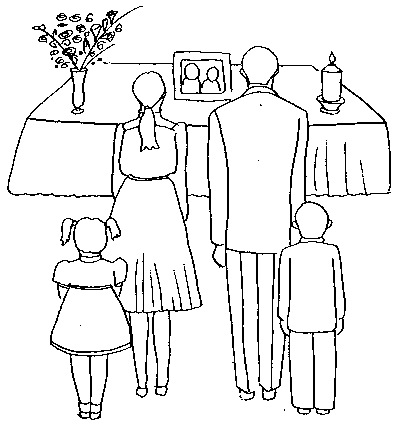
Figure 4-1
4.1. Positions during family Pledge service
[Page 31]
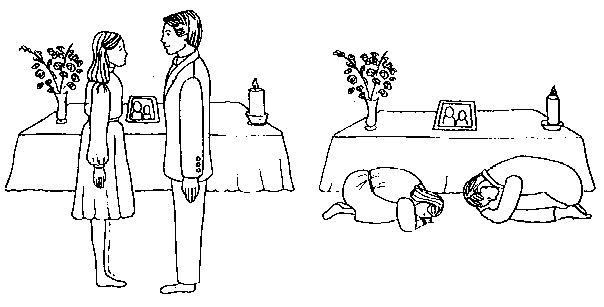
Figure 4-2
4.2. Husband and wife offer one full bow to each other
children in offering one full bow to their parents (refer to diagram 4.3). According to True Parents' tradition, children should then come to kiss and hug their parents.
If time permits, either parent should give a speech of internal guidance to their children -- a personal testimony, and/or announcements, news of the True Family, etc.
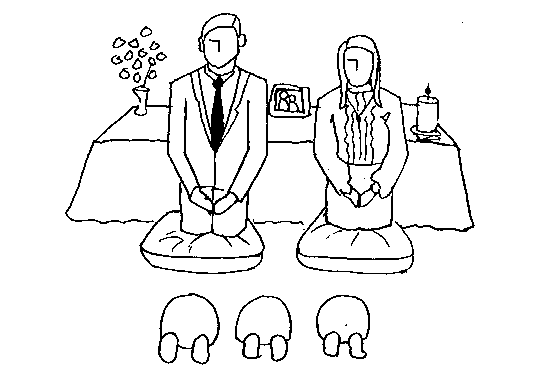
Figure 4-3
4.3. Children offer one full bow to their parents
[Page 32]
This would be an appropriate time for the family to share the "offering dish" if they had not recently received guests. (See chapter 22, Blessed Family Practices: Offering Dish.)
Through such external practices as bowing to each other, all family members are reminded to respect each other. They can recognize how important it is to share reverent love and determine once again to make ideal family relationships.
Father has addressed the importance of educating blessed children about attending God at Pledge service in The Way of God's Will.
Every Sunday you should bow to God in your own family. Blessed families must set the example in serving Heaven. You must look forward to Sundays and the first day of every month with both your mind and body fully dressed.
We must make every Sunday morning the moment which our children are eager for. On Saturdays, we must clean house and then the whole family should happily gather at a set time.
Only Blessed Members Living in a Center
If there are only blessed members (whether or not they have started married life) living in a center, the center director may lead The Pledge of the Families before My Pledge is recited and then follow the format of the general Pledge service.
Both Blessed and Single Members Living in a Center
If both blessed and single members live in the center, it is not correct for The Pledge of the Families to be recited in the general Pledge service. Blessed members who desire to say The Pledge of the Families may do so in their own rooms before attending the general Pledge service, or a center or department may choose to hold a separate blessed members' Pledge service.
If it is decided to follow this tradition, all blessed members in the center should gather; one blessed member should lead the service according to the following format:
Three full bows Recitation of The Pledge of the Families Representative prayer Unison prayer
This service should begin at 4:15 or 4:30 a.m. If possible, offer this service in a room other than the one in which the general Pledge service is to be held.
Upon completion of this service, all blessed members should attend the general Pledge service.
If Only One Blessed Family Lives in the Center. If there is only one blessed family living in a center, they may choose to hold a family Pledge service in their own quarters (according to the first category listed) at 4:15 or 4:30 a.m. Their children do not need to attend the general Pledge service (although it would not be inappropriate) if they participate in a family level Pledge service. See the following section.
However, if the entire family cannot come, at least one or both of the parents should attend the general Pledge service representing the family.
Children's Participation In Pledge Service
Young children should participate in the Pledge service with their parents as soon as it is possible. Babies from the age of six months, for example, can be held in their parents' arms during Pledge service.
It is important for parents to teach their children this tradition and guide them in it during their formative years. Children are able to learn the attitude of attendance through this tradition; therefore, they should be brought to Pledge service. Even if the firstborn child initially struggles with this tradition, once it is accepted by the child, he or she will be the one to inspire and help the younger children observe it later on.
General Pledge Service. If babies or young children brought to a public Pledge service cry too loudly and this is disturbing other members, it is best that the parent leave the service area with the child. However, it is important that parents continue to bring them every Sunday to help accustom their children to this tradition.
Family Level Pledge Service. Although it may be too difficult for young children to attend public Pledge service, they should attend Pledge services held on the family level (i.e., if a family Pledge service is held before the general Pledge service), even if they cry.
If Pledge is Missed
It is not proper to walk into a Pledge service late and begin bows and recitation of Pledge. One should simply follow the service from the point he or she arrived.
If one missed Pledge service at 5:00 a.m., he or she should recite it later, with an attitude of repentance.
Father's Insight into the Meaning of Pledge
The following is excerpted from True Father's "My Pledge" speech given November 21, 1982, from Today's World, February 1983.
The fifth paragraph is the conclusion of the entire Pledge; in it we project what we are going to create -- one sovereignty, one nation, one people, one language and culture centered upon God.
In the morning when you set out to do your tasks, you have to really pray in order to prepare yourselves to go out, do your mission, and return safely at night. The environment is always wooing you, always trying to divert your mind from the central righteous position. Persecution gives people protection and spurs them to greater discipline and greater devotion to their mission.
I want you to understand that what Satan hates most is love. Our determination this morning should be to pledge to God to do the things in which God will take the utmost delight and the things which Satan will hate most. Remember, though, if you promise to God what Satan most hates, then wherever you go, Satan will kick you and persecute you.
What Satan hates most is one sovereignty. He is allergic to that word when it is used centering on God. Satan's tactic is to divide and conquer, to incite people to oppose each other and fight among themselves. But God's message is to bring everyone in, unite them and let them become one.
Deny yourself and go up step by step, to the family, society, nation, world and cosmos. Then when you reach the center, the individual is no longer just yourself, but the universe. And the universe is the individual. You become directly connected to the universe; you are a public person. Unselfish, public acts elevate people.
If you resolve to avoid anything which Satan likes, decision-making becomes simpler.
Proud of the One Sovereignty
We live for the sake of one sovereignty, one kingdom, one heavenly citizenship. God has been longing for this from the day of creation. You pledged this morning, "I am proud of the one sovereignty." We must have pride and authority as the unique, historical independence army, fighting for the independence of the Kingdom of Heaven. We have been chosen for that role.
If you fail this mission here on earth, when you are taken to the spirit world, you will have nothing to say, nothing to report; you will be unable to lift up your faces. For that reason, I am so serious, every moment of the day. Be bold and strong.
Proud of the One People
Wherever you are, love that nation as a heavenly person -- love it more than even its own citizens do. Instead of helping Korea, all this help (i.e., Korean leaders) has come to America, because America represents the world. America's hope lies in serving the world. In this sense, heavenly people are proud people who have no boundaries and reach out to love the world for the purpose of God.
Proud of the One Land
We don't recognize boundaries. Boundaries were made by Satan. "Proud of the one land." I long for that one land. I will invest myself for the sake of the world, wherever the people will come to God first. I am taking the shortest route, choosing whatever will bring the world back to God most quickly.
As a national citizen alone, you can never enter the Kingdom of Heaven. You must be a world citizen, always embracing the world and thinking about the four billion people of the world and their well- being. By living and breathing for the world, you shall enter the Kingdom of Heaven. Be a Moonie. Love the world.
Proud of the One Language and Culture Centered Upon God
The mother tongue should be the True Parents' language. Culture is like the direction of the wind blowing in a given country. God's kingdom is our motherland; but God happens to be working through Korea, so Korea became the originating point or the homeland of faith.
From the beginning of their history, Korean people have worshipped God. Reverence for God is very strong. The basic nature of Koreans is to want to help others, rather than to be helped. To help the country is part of the Korean spirit. Another quality of the Korean people is their absolute messianic fervor. People always called on the name of God; they trusted in God. There is a prevailing messianic concept among Koreans.
From the law of indemnity, Korea was the most appropriate nation to further the providence, playing a major and central role in human history. That is the historical background I came from. This is not my individual ideology, but God's revelation.
When you say, "One language and culture centered upon God," do you put in parentheses afterwards "impossible!" You have been thinking that way, haven't you? But people come together and get married, without even having a language in common! Unification is occurring; learning a language is a technical matter.
Compared to our tradition of international marriages, such as at Madison Square Garden or in Korea, creating one language and culture is nothing.
When you go to the Kingdom of Heaven, you will discover that its language is Korean. English is spoken only in the colonies of the Kingdom of Heaven! When the Unification Church movement becomes more advanced, the international and official language of the Unification Church shall be Korean; the official conferences will be conducted in Korean, similar to the Catholic conferences, which are conducted in Latin.
Proud of Becoming the Child of the One True Parent
We are proud of the one parent-child relationship. Therefore, all the people of the world are our brothers or sisters.
Proud of the Family Who Is to Inherit One Tradition
Centered on True Parents, we have the True Family tradition. The purpose of creation is to fulfill the heavenly four-position foundation. That is nothing more than the creation of the family foundation. Three generations are necessary to make up the heavenly four-position foundation.
When you love, you love your parents first, then your children, before you love your spouse. That is heavenly law.
Tradition means tradition centered on love: love for parents, love for children, and love between husband and wife. That is the True Parents' tradition, True Family tradition. The family is like a textbook of love. You are trying to apply that textbook to different levels -- society, nation, world -- based on what you learned in the training center, the family. We look at the family as the microcosm of the universe, so that whatever we do in the family we regard as training and discipline for our role in the society, nation and world.
So look at old people as your grandparents, people your age as your brothers and sisters, young people as your children. Regard all people as expansions of your family. By practicing this theory, you can reach everywhere. The center is the family.
Because of the satanic element, we have not yet fulfilled this family tradition. We are going out and fighting for it, through sacrificial service. We will continue until we bring the whole world under God.
Proud of Being a Laborer Who is Working to Establish the One World of the Heart
One heart. By heart we shall fulfill the heavenly ideal. Anything that goes against it, we will fight and prevail over. Not with weapons such as swords and rifles, but with these last three points of the Pledge-- father-son relationship, tradition, and heavenly heart. We will devote our whole life for this purpose.
Have you ever thought about such exciting meanings in the Pledge? When Sunday comes around, do you get bored by the thought of saying Pledge? Or do you wish Sunday would come every other day? Or maybe every day? Even every hour? You are always thinking that Sundays come around too quickly!
God loves Moonies. He doesn't just look at your faces but at your heart and mind. Can you pledge before Him, "I will never let You down; You know me. I will pick myself up and go on. I shall make it." If you recite this Pledge seriously and put these contents into practice, God will stay close to you. So be bold and strong.
These seven points are what Satan hates most; he doesn't want to see any of them accomplished. But God likes these most of all. Thus, these seven points are the battleground upon which good and evil are fighting. Good and evil. God and Satan, heaven and earth, are determined here. You are the center of the battle. You must go beyond the family, to the society, nation, world and cosmos -- until you reach the heart of God.
Starting from the heart of God, we inherit the true tradition and enter the true parent-child relationship. Ultimately, then, we will fulfill the one nation, one sovereignty, one people and one language and culture centered upon God. That is our course. That is our Pledge, every Sunday morning. When we make this Pledge, we promise something to God. So we have to deliver on that promise.
Today you have come to realize fully that this is not just a ritual of our movement, but words we live by and a promise we determine to fulfill as champions of God.
1
For medical reasons (such as pregnancy, handicap, illness) it is acceptable to offer bows to the waist.